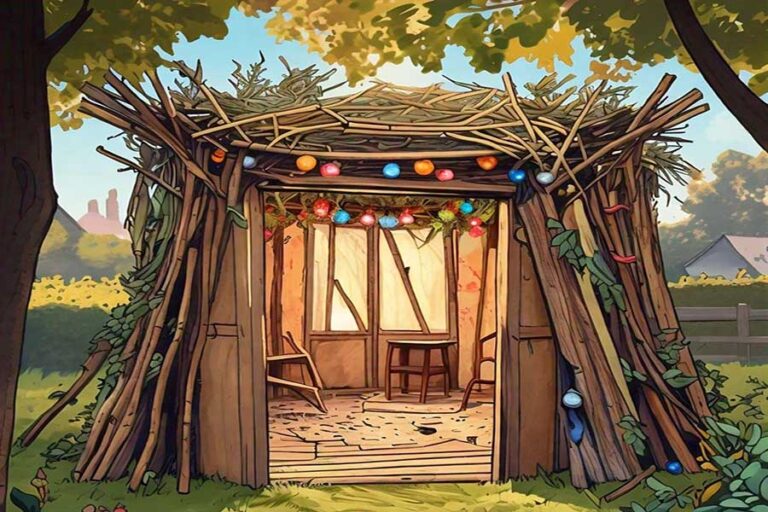Feeling Displaced
Our people have suffered greatly this past year. Many Jews were murdered, thousands wounded, and over one hundred remain in captivity. In addition, over 100,000 Israelis were displaced from their homes, and tens of thousands remain displaced a full year later.
Throughout this year, we have worked to empathize with those in pain. Sukkot reminds us of those living in temporary conditions as we are commanded to do the same.
The mitzvah of sukkah requires more than just eating meals in the sukkah; it involves moving our lives and most cherished items from home to sukkah. The mishnah teaches us that âfor all seven days, we make the sukkah our dirat keva (permanent dwelling)â (Sukkah 28b).
Though the sukkah serves as our dirat keva, it must be constructed as a dirat arai (temporary dwelling). Rava explains that this is why a sukkah cannot be taller than twenty amot â âFor seven days, we need to leave the dirat keva and sit in a dirat araiâ (Sukkah 2a). While sitting in the sukkah, we should feel like we are in a temporary structure.
Why must the sukkah be a dirat arai? If it is our dirat keva for the chag, why not erect a bona fide dirat keva?
Moreover, considering Chag HaSukkot is zâman simchateinu (the time of our happiness), wouldnât we be happier in a sturdy sukkah? How do we find joy in a temporary structure?
A Metaphor For Life in This World
The Chida (Simchat HaRegel, Sukkot) explains that the temporary structure models our life in this world. It reminds us that our existence in this world and its pleasures are temporary, ephemeral, and insignificant.
Though we know that the next world is the ultimate one, we often become overly focused on this world and its pleasures. This focus can be even more intense at the end of a successful harvest season when our homes are full of the fruits of our labor.
We must remember that this world is merely the âcorridor to the palaceâ (Avot 4:16), the gateway to the next world. This world and its pleasures are not the ultimate end goal. There is a bigger, better, and more meaningful place that we reach after passing through this world.
Sitting in a temporary structure reminds us that our life in this world is temporary and transient, influencing how we live year-round. We should recognize our stay here is brief and not be concerned with building luxury homes. This is how the Chofetz Chaim explained why his home and furnishings were so basic. He likened himself to a traveler staying in a simple hotel room. Just as a traveler does not need extravagance, neither do we, as we are only passing through on our way to the next world.
Vulnerability and Dependency
A dirat arai is not only temporary but also less sturdy and reliable than a dirat keva. Sitting in such a sukkah reminds us of our vulnerability and reliance on Hashemâs protection.
Agricultural success can go to oneâs head. The farmer can attribute his success to his ability and efforts alone and forget his need for Hashemâs assistance and support (Rashbam, Vayikra 23:39). Life in a dirat keva can lead to a similar conclusion â a false sense of security. We feel safe and secure behind our steel and concrete walls and see them as what protects us.
We sit in the sukkah to commemorate the sukkot that Hashem provided for us in the desert. Sitting in a dirat arai reminds us that our safety does not depend on the strength of the walls but, instead, on the One who strengthens them and us.
Many of us were taught the story of the three little pigs as children. The story’s moral is that our safety hinges on building solid walls. Otherwise, the wolf will huff and puff and blow our house down. The attacks of 9/11 reminded us that evil wolves can blow even the strongest walls down. It is Hashem, not the material of our walls, who protects us.
This is why we leave our sturdy homes and reside in a dirat arai. We show that we place our faith and trust in Hashem, not in our âsafeâ homes. While on the surface, our security and safety seem to come only from our own hishtadlut, when we look past the surface, we realize that everything comes from Hashem.
Zâman Simchateinu â True Reasons to Be Happy
The Sefat Emet (Sukkot 5645) explains that this recognition is also the basis of our simchah on Sukkot. He asserts that âthere is no happiness like the happiness of the one who truly relies on Hashem.â A person who relies on his wealth and stone walls knows he is unsafe. In contrast, one who trusts in Hashem is happy because he has good reason to feel secure and confident about his future.
Rav S.R. Hirsch adds that recognizing Hashemâs support inspires a deeper basis for joy. We celebrate not just our security and confidence in future success but also our relationship with Hashem itself. This, adds Rav Hirsch, is true and pure simchah â a celebration of what truly matters.
As we pray for the swift return of those displaced, let us also internalize the lessons of displacement, which is meant to remind us of life’s transience and our vulnerability and reinforce our belief in the One who truly protects us in our turbulent world.
May our efforts lead to Hashemâs swift restoration of the fallen sukkah of David.


